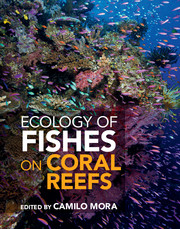Book contents
- Frontmatter
- Contents
- Preface
- Foreword
- List of contributors
- PART I BASIC ECOLOGY
- PART II PATTERNS AND PROCESSES
- PART III HUMAN FINGERPRINTS
- PART IV CONSERVATION
- PART V DEBATES AND PARADIGM SHIFTS
- 23 Is dispersal of larval reef fishes passive?
- 24 Density dependence and independence and the population dynamics of coral reef fishes
- 25 Equilibrial versus non-equilibrial dynamics in coral reef fishes
- 26 Cryptic density dependence: integrating supply-side ecology with population regulation
- 27 Priority effects
- 28 Inverted trophic pyramids
- 29 Shifting baselines in coral reef fishes
- 30 Pluralism explains diversity in the Coral Triangle
- 31 Reef fish biogeographical regions
- 32 Size and sex change
- 33 Quantifying reef fishes: bias in observational approaches
- 34 Seascape ecology of fishes on coral reefs
- 35 The future for coral reef fishes
- 36 Perpetual struggle for conservation in a crowded world and the needed paradigm shift for easing ultimate burdens
- References
- Index
24 - Density dependence and independence and the population dynamics of coral reef fishes
from PART V - DEBATES AND PARADIGM SHIFTS
Published online by Cambridge University Press: 05 May 2015
- Frontmatter
- Contents
- Preface
- Foreword
- List of contributors
- PART I BASIC ECOLOGY
- PART II PATTERNS AND PROCESSES
- PART III HUMAN FINGERPRINTS
- PART IV CONSERVATION
- PART V DEBATES AND PARADIGM SHIFTS
- 23 Is dispersal of larval reef fishes passive?
- 24 Density dependence and independence and the population dynamics of coral reef fishes
- 25 Equilibrial versus non-equilibrial dynamics in coral reef fishes
- 26 Cryptic density dependence: integrating supply-side ecology with population regulation
- 27 Priority effects
- 28 Inverted trophic pyramids
- 29 Shifting baselines in coral reef fishes
- 30 Pluralism explains diversity in the Coral Triangle
- 31 Reef fish biogeographical regions
- 32 Size and sex change
- 33 Quantifying reef fishes: bias in observational approaches
- 34 Seascape ecology of fishes on coral reefs
- 35 The future for coral reef fishes
- 36 Perpetual struggle for conservation in a crowded world and the needed paradigm shift for easing ultimate burdens
- References
- Index
Summary
Ecologists have spent significant amounts of time attempting to determine the “relative importance” of density dependent and independent factors to the population dynamics of coral reef fishes. They have sought to understand whether low levels of larval supply and settlement limit populations, or whether post-settlement processes like competition and predation determine abundance. Recent advances have integrated density dependent and independent factors into more complete population models, uncovered mechanisms of density dependence and demonstrated the temporal density dependence required for population regulation. Competition for shelter from predators is an important mechanism for density-dependent mortality, while agonistic interactions affect growth, fecundity, and larval quality. We currently understand that both types of factors are important, but that density dependence must occur at some place and time if a population is to be regulated and persist for many generations, neither going extinct nor increasing to infinity.
Many marine species including almost all coral reef fishes have a bipartite life cycle in which demersal adults produce pelagic larvae [2226]. Replenishment of local populations occurs through the settlement of these pelagic individuals to the reef environment and is dependent upon the supply of larvae to reefs [401]. In coral reef fishes, some larvae settle to their natal reefs [e.g. 460,1287,2447], but the vagaries of larval survival and transport effectively decouple the intensity of replenishment from local populations size [401]. Therefore, ecologists have long sought to uncover whether pre-settlement, densityindependent processes like larval supply and settlement (i.e. “recruitment limitation” [687]) limit population size or whether post-settlement, density-dependent dynamics (i.e. competition and predation; reviews by [1120,1287]) determine the abundance of fishes on coral reefs [1123].
The question of the relative importance of density dependence and independence is vital to understanding how populations persist through time and has implications for ecological theory in general, conservation and management, especially of fisheries [1124,1760,2527,2604].
- Type
- Chapter
- Information
- Ecology of Fishes on Coral Reefs , pp. 227 - 231Publisher: Cambridge University PressPrint publication year: 2015
- 4
- Cited by

